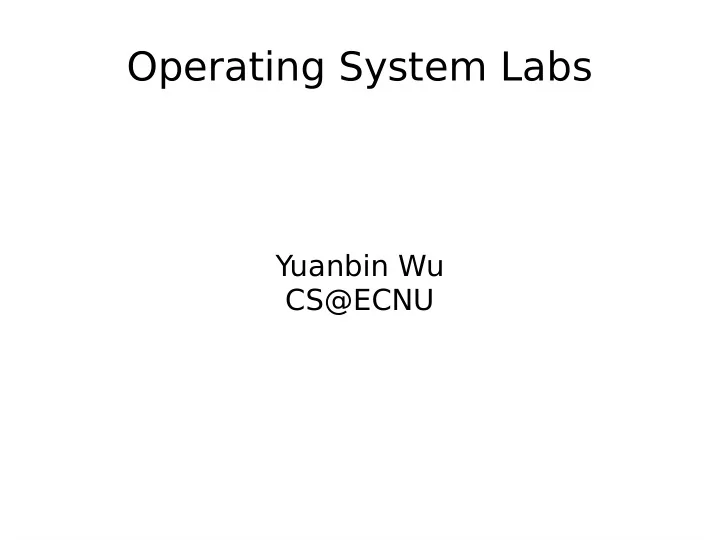

Operating System Labs Yuanbin Wu CS@ECNU
Operating System Labs ● Project 2 Due – 21:00, Oct. 24 ● Project 3 – Group of 3 – If you can not fjnd a partner, drop us an email – You now have 3 “late days”, but start early! – We will have oral test at week 12 (Nov. 23)
Operating System Labs ● C Memory API ● Free Memory Management
C Memory API ● T ype of memory – Stack – Heap
C Memory API ● Stack – Allocated / Deallocate automatically – By the compiler – Automatic memory
C Memory API ● Stack – Example (local variable) void func() { int x = 0; ... } – You only declear the variable – Compiler will allocate it when call the function – Also deallocate it when func returns
C Memory API ● Heap – Allocated / Deallocate explicitly – By you, the programmer
C Memory API ● Heap – Example (malloc) void func() { int *ptr = (int*)malloc(sizeof(int)); ... } – Both stack and heap allocation – When func returns, ● Stack memory will be deallocated ● Heap memory is still there
C Memory API 00000000 ● Stack and Heap Code – Heap Heap ● From low addr to high addr – Stack ● From high addr to low addr ● Let's see Free Stack FFFFFFFF
C Memory API ● Malloc #include <stdlib.h> void *malloc(size_t size); – If failed, return NULL ● Free #include <stdlib.h> void free(void* ptr);
C Memory API ● Common errors – Forget to allocate memory – Not allocating enough memory – Forget to initialize allocated memory – Forget to free memory – Free memory before you are done with it – Free memory repeatedly – Call free() incorrectly
C Memory API ● Segment fault char *src = "hello"; char *dst; // oops! unallocated strcpy(dst, src); // segfault and die ● run this code, it will likely lead to a segmentation fault ● It is a fancy term for YOU DID SOMETHING WRONG WITH MEMORY YOU FOOLISH PROGRAMMER AND I AM ANGRY .
Free Memory Management Dark Forest of Pointers
Free Memory Management ● Fixed-size unit – Paging – Problem: internal fragmenation ● Variable-size unit – User level memory allocation library – Kernel level: VM implemented with segmentation – Problem: external fragmentation
Free Memory Management ● Free memory management – How to manage variable-size free memory units – How to implement ● malloc(size_t size) ● free(void *ptr)
Free Memory Management ● Assumptions – Focus on external fragmentation – No compaction – Manage a contiguous region of bytes (by mmap() system call)
Free Memory Management ● Low-level Mechanisms – Splitting and Coalescing – Tracking allocated regions – Implementation of a free list ● High-level Intelligence – Best fjt – Worst fjt – First fjt – Next fjt
Free Memory Management ● Splitting and Coalescing – Free list: a set of free chunks – T wo chunks (10 bytes each)
Free Memory Management ● Splitting and Coalescing – request less than 10 bytes? (e.g. malloc(1)) – Splitting
Free Memory Management ● Splitting and Coalescing – Free a chunk? – Malloc(20)? – Coalescing
Free Memory Management ● Tracking Allocated Regions – Observation on free(void *ptr) ● No size parameter – Given a pointer, the malloc library could determine the size of region – How? ● Some extra information ● header of a memory block
Free Memory Management ● Tracking Allocated Regions – header typedef struct __header_t { int size; int magic; } header_t; – malloc(20)
Free Memory Management ● Tracking Allocated Regions – header: example
Free Memory Management ● Tracking Allocated Regions – free(ptr) ● Get the size of the region void free(void *ptr) { header_t *hptr = (void *)ptr - sizeof(header_t); } ● Check whether ptr is valid assert(hptr->magic == 1234567)
Free Memory Management ● Implementation of the Free List – Free list – Implementation ● List node (allocate a node when needed) ● Can NOT do this here! ● All you have is a given free space – How to build a free list inside the free space?
Free Memory Management ● Implementation of the Free List – Node in free list typedef struct __node_t { int size; struct __node_t *next; } node_t;
Free Memory Management ● Implementation of the Free List – Initialization (e.g. 4096) // mmap() returns a pointer to a chunk of free space node_t *head = mmap(NULL, 4096, PROT_READ| PROT_WRITE, MAP_ANON|MAP_PRIVATE, -1, 0); head->size = 4096 - sizeof(node_t); head->next = NULL;
Free Memory Management ● Implementation of the Free List – malloc(100)
● malloc(100)*3
● Free(16500) – 16384+108+8
● Free()*3 ● Coalesce – Merge adjacent chunks
Free Memory Management ● Growing the Heap – What if the heap runs out of space? ● Return NULL – Increase the size of heap ● OS fjnd free phycical pages ● Map them into address space of the prcess
Free Memory Management ● Summary of low-level Mechanisms – Splitting and Coalescing – T racking allocated regions – Implementation of a free list – Growing the heap
Free Memory Management ● High-level intelligence – How to fjnd the proper nodes in the free list? ● Less fragmentation ● Fast allocation – Some simple strategies ● The stream of allocation and free requests can be arbitrary ● Any strategy could be arbitraily bad/good
Free Memory Management ● Best Fit – Find the smallest feasible node ● Worst Fit – Find the largest feasible node ● First Fit – Find the fjrst feasible node
Free Memory Management ● Example – – Best fjt – Worst fjt
Free Memory Management ● Other approaches – Segregated List ● Slab allocator – Buddy Allocation ● Binary search tree
Recommend
More recommend